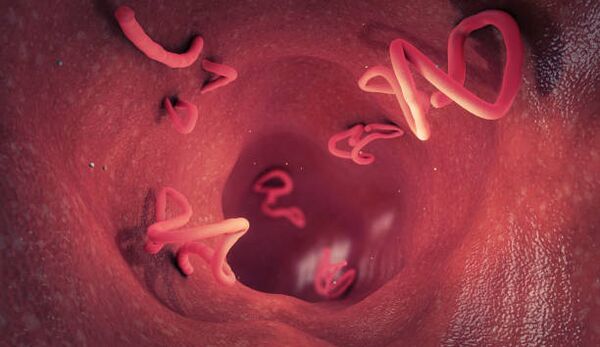A worm is a worm that lives a parasitic lifestyle in the body of its host - a person. Age does not matter. Adults and children are equally susceptible to infection. The classification of helminthiases is very broad, especially in countries with hot climates.

There are 3 classes of parasitic worms:
- round (nematode) - pinworms, roundworms;
- tapeworms (cestodes) - pig tapeworms, cow tapeworms, echinococcus;
- flatworm, worm (trematod).
The most common worm in children is the cream worm, which causes enterobiasis. These helminths are small, averaging up to 1 cm, white-gray in color with a curved body. The localization of these parasites is the large intestine, but they can also spread to the lower part of the small intestine. Cream worms breed on the skin near the anus. At night, female cream worms come out to lay eggs in the folds of the skin, often penetrating the labia of girls, ending in an infectious disease of the genitals. Overall, these helminths live for about 1-1. 5 months. The process of self-infection in a child can lead to the fact that the malaise will last for years. Parasites can be detected with the naked eye in feces.
Ringworm is another type of worm that is most common in children. Of the special species, reaching a length of 15 cm, these nematodes settle in the lumen of the small intestinal loop, moving towards the moving clods of food. Roundworms very rarely enter feces. Females release eggs periodically, which can be found in fecal analysis. But if during the study they are not found, this does not mean that the child is not infected. The life cycle of ringworms can last for several years.
The reasons
The baby's curiosity is realized by his fingers, the child, learning about the world, actively touches everything under his arm and immediately pulls it into his mouth, trying to gain strength and taste. Thus, pinworm eggs safely enter the digestive tract of their small future hosts.
A child is infected with worm eggs from the surface of unwashed fruit, while drinking contaminated water. Often, the infection occurs when communicating with animals, or when playing on the ground, in the sand, where cats and dogs like to solve their physiological problems. After a walk, children often do not wash their hands, and all the dirt, along with the parasite eggs, gets into their mouths.
Symptoms
If a child has been infected with a large number of parasitic worm eggs, then a sharp deterioration can occur within a few days. In milder cases, the first symptoms of aggression appear after a few weeks or a few months. Much depends on the child's immunity. He may overcome the parasite and restrain its development. But gradually the defenses are reduced, and helminths infect the body, causing serious problems.
The first signs are symptoms of poisoning (intoxication). The vital activity of worms is accompanied by the release of large amounts of animal poisons that can poison the child's body. In the gut, parasitic worms use up nutrients, as a result of which the baby gradually lacks protein, carbohydrates, fats and vitamins.
Children have:
- reduction,
- pale skin,
- weakness, frequent dizziness,
- rise in body temperature, headache,
- nightmare,
- tears,
- depressed mood.
Intestinal diseases are manifested - constipation, loose stools, rumbling and pain in the abdomen, attacks of nausea and vomiting, painful sensations in different parts of the abdomen, and bloating. The disease can be accompanied by allergic conditions: itching, rash, cough, inflammation of the mucous membranes of the respiratory tract. Weakening of immunity leads to the addition of infectious diseases.
Diagnostics and treatment
The diagnosis of helminthiasis in feces is quite difficult. This is due to the fact that roundworm eggs or cream worms do not appear in the feces on a daily basis, and the smear microscopy technique from the analysis requires excellent care. To improve the reliability of fecal analysis for worm eggs, it is recommended to take at least 3 consecutive days.
If there is an increased risk of worm infection (contact with animals, child playing on the ground or on open sandbanks, the child's habit of taking objects in his mouth, biting nails or licking fingers, etc. ), it is recommended to undergo an in-depth examination, including, in additiontriple stool analysis, special blood tests detect antibodies to worms.
If there are allergic manifestations of unknown origin, increased number of eosinophils in blood tests, persistent intestinal dysbiosis, it is recommended to donate blood for the determination of class E immunoglobulins (Ig E and G) to ringworms and other helminths. You can check for worms in pets.
Assessing the overall signs and indirect anamnesis, the doctor may recommend antihelminthic therapy without direct evidence of the presence of worms in the child, if other pathologies causing similar clinical manifestations are excluded. From all family members to prevent the formation of foci of infection with each other with worm eggs. In this situation, in addition, it is necessary to strengthen hygiene measures, in particular, decoction and ironing of bedding and personal linen on both sides.
























